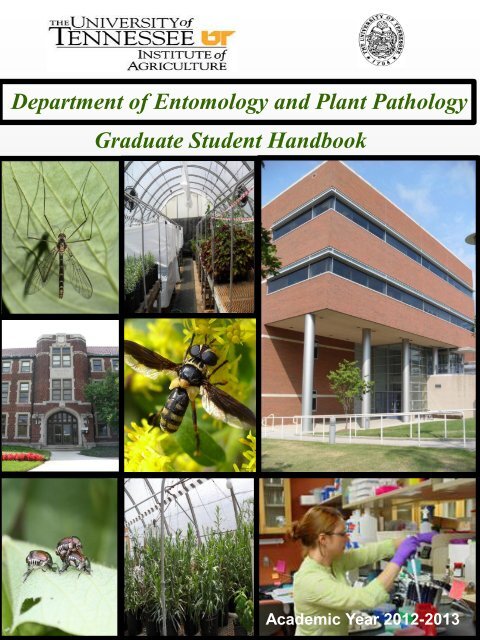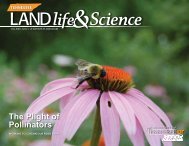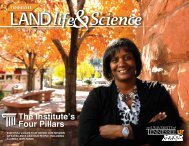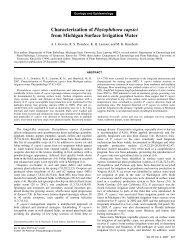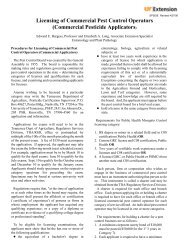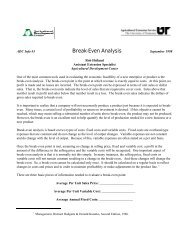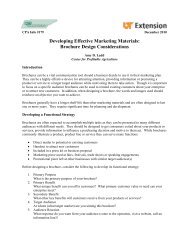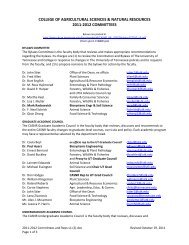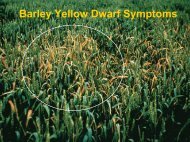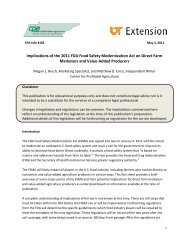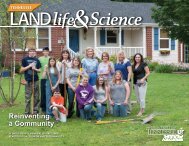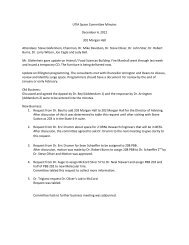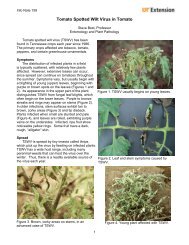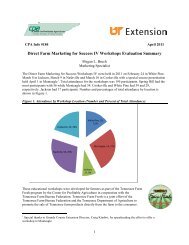Graduate Student Handbook - The University of Tennessee Institute ...
Graduate Student Handbook - The University of Tennessee Institute ...
Graduate Student Handbook - The University of Tennessee Institute ...
You also want an ePaper? Increase the reach of your titles
YUMPU automatically turns print PDFs into web optimized ePapers that Google loves.
Department <strong>of</strong> Entomology and Plant Pathology<br />
<strong>Graduate</strong> <strong>Student</strong> <strong>Handbook</strong><br />
Academic Year 2012-2013
ENTOMOLOGY & PLANT PATHOLOGY<br />
GRADUATE STUDENT HANDBOOK<br />
TABLE OF CONTENTS<br />
Welcome Statement 1<br />
Resources 2<br />
M.S. Program Introduction 3<br />
M.S. Specializations 4<br />
Ph.D. Specializations 5<br />
M.S. <strong>Student</strong> Checklist 6<br />
Ph.D. <strong>Student</strong> Checklist 7<br />
Core Curriculum 8<br />
General Procedures for New <strong>Student</strong>s 9<br />
Entomology and Plant Pathology Faculty 10<br />
Tentative Schedule <strong>of</strong> Entomology & Plant Pathology Courses 11<br />
Entomology & Plant Pathology Courses Offered – Schedule 13<br />
Entomology and Plant Pathology Course Descriptions 15<br />
Recommended Course in other Departments 23<br />
Seminar 25<br />
Research and Work 30<br />
Termination 30<br />
<strong>The</strong>sis or Dissertation 30<br />
Admission to Candidacy M.S. Degree 31<br />
Admission to Candidacy Ph.D. Degree 31<br />
<strong>Institute</strong> Policies and Rights for <strong>Graduate</strong> Research Assistants 32<br />
Non-Assistantship <strong>Student</strong>s 34<br />
Fellowships 34<br />
Loans 34<br />
Employment 34<br />
Resources for <strong>Student</strong> Problem Resolution 35<br />
<strong>Graduate</strong> <strong>Student</strong> Association 37<br />
Transportation Policy 38<br />
Travel Procedures 40<br />
Forms 44
1<br />
WELCOME STATEMENT<br />
Welcome to <strong>The</strong> <strong>University</strong> <strong>of</strong> <strong>Tennessee</strong>. You are here because we think that you will be a<br />
successful student and that we can and will provide you with direction toward your pr<strong>of</strong>essional<br />
goals. Bear in mind that you are no longer an undergraduate student. Instead, you are on your<br />
way to becoming a pr<strong>of</strong>essional in entomology, plant pathology or one <strong>of</strong> our subdisciplines.<br />
We expect you to display high standards <strong>of</strong> personal and pr<strong>of</strong>essional integrity and to take full<br />
responsibility for knowing and following all the <strong>University</strong> and Departmental requirements that<br />
are pertinent to your program, from how to form your committee to when to file for graduation.<br />
You are expected to be aware <strong>of</strong> and satisfy all regulations governing your work and study at the<br />
<strong>University</strong>. Because that seems like (and in fact is) an enormously complex task, we will<br />
provide you with as much assistance as we can.<br />
This document provides a formal repository for policy statements, procedures and<br />
requirements and some institutional philosophy. This is not intended to be the sole source <strong>of</strong><br />
information, but should provide you with written guidance in many areas. This is a living<br />
document. Next year's will differ from this one, as policies change or we find ways <strong>of</strong><br />
accomplishing some tasks that are better than those referenced herein. This handbook will be<br />
useful to you for as long as you are a student at <strong>The</strong> <strong>University</strong> <strong>of</strong> <strong>Tennessee</strong> in the Department<br />
<strong>of</strong> Entomology and Plant Pathology. Like so much <strong>of</strong> your educational materials, it may not<br />
always tell you exactly what to do or where to find something, but it will help you find the right<br />
source for solving an issue. If, after seeking information in this handbook, you are still uncertain<br />
about appropriate procedures, seek help from your advisor or a member <strong>of</strong> our staff.<br />
<strong>The</strong> mission <strong>of</strong> Entomology and Plant Pathology at <strong>The</strong> <strong>University</strong> <strong>of</strong> <strong>Tennessee</strong> is to<br />
advance scientific knowledge and provide beneficial information to improve the sustainability <strong>of</strong><br />
food and fiber production, protection <strong>of</strong> natural resources, and the lives <strong>of</strong> people in <strong>Tennessee</strong><br />
and beyond. We aim to fulfill this mission through innovative research, knowledge-based<br />
outreach and excellence in teaching. As a student, you are a vital part <strong>of</strong> our department and<br />
mission. <strong>The</strong> Department <strong>of</strong> Entomology and Plant Pathology strives to adhere to the highest<br />
ethical standards <strong>of</strong> integrity, equality, and respect in the performance <strong>of</strong> our duties and<br />
interactions with colleagues, students, stakeholders, and cooperators.<br />
I have an open door policy for all members <strong>of</strong> the Department. I expect to be a resource for<br />
information or philosophy for almost anything that affects your pr<strong>of</strong>essional growth. If I am not<br />
available at that time an appointment will be made for you, generally within 24 hours if I am in<br />
town. <strong>The</strong> Business Manager also has an open door policy and will be able to help with any<br />
procedure in this handbook.<br />
Robert N. Trigiano<br />
Pr<strong>of</strong>essor and Interim Department Head<br />
374 Plant Biotechnology Building<br />
rtrigian@utk.edu
2<br />
RESOURCES<br />
<strong>University</strong> <strong>of</strong> <strong>Tennessee</strong> <strong>Graduate</strong> School http://gradschool.utk.edu/default.shtml<br />
College <strong>of</strong> Agriculture Sciences and Natural Resources (CASNR)<br />
https://ag.tennessee.edu/casnr/Pages/default.aspx<br />
<strong>University</strong> <strong>of</strong> <strong>Tennessee</strong> Agriculture Experiment Station (TAES)<br />
http://taes.tennessee.edu/<br />
Entomology & Plant Pathology (EPP)<br />
http://eppserver.ag.utk.edu/<br />
<strong>University</strong> <strong>of</strong> <strong>Tennessee</strong> <strong>Graduate</strong> Orientation<br />
http://gradschool.utk.edu/orientation/welcome.shtml<br />
<strong>University</strong> <strong>of</strong> <strong>Tennessee</strong> <strong>Graduate</strong> Catalogue http://catalog.utk.edu/index.php?catoid=2<br />
<strong>The</strong>sis/Dissertation Website<br />
http://web.utk.edu/~thesis/<br />
<strong>Graduate</strong> and International Admissions<br />
http://graduateadmissions.utk.edu/<br />
SPEAK Testing Program<br />
http://gradschool.utk.edu/speaktest.shtml<br />
Center for International Education<br />
http://gradschool.utk.edu/orientation/international.shtml<br />
International House<br />
http://graduateadmissions.utk.edu/<br />
<strong>Student</strong> Resources (general orientation information, maps, transportation, etc.)<br />
http://gradschool.utk.edu/orientation/sresources.shtml<br />
http://www.utk.edu/currentstudents/<br />
<strong>Student</strong> Health Services http://gradschool.utk.edu/orientation/health.shtml<br />
Counseling Center<br />
http://web.utk.edu/~counselingcenter<br />
VolAware<br />
http://volaware.utk.edu<br />
Library<br />
http://www.lib.utk.edu/regs/gradservices.html<br />
OIT<br />
http://oit.utk.edu/<br />
Multicultural <strong>Student</strong> Life/Black Cultural Center<br />
http://omsa.utk.edu<br />
Office <strong>of</strong> Equity and Diversity or Judicial Affairs<br />
http://web.utk.edu/~osja/<br />
<strong>Graduate</strong> <strong>Student</strong> Appeals Procedure<br />
http://gradschool.utk.edu/<strong>Graduate</strong>Council/AppeComm/AppealProcedureApproved2009.<br />
pdf<br />
<strong>Graduate</strong> <strong>Student</strong> Senate<br />
http://web.utk.edu/~gss
3<br />
M.S. PROGRAM IN ENTOMOLOGY & PLANT PATHOLOGY<br />
PH.D. IN THE PLANTS, SOILS AND INSECTS (PSI) PROGRAM<br />
INTRODUCTION<br />
This manual serves as a guide for M.S. students in the Department <strong>of</strong> Entomology &<br />
Plant Pathology and Ph.D. students in related concentrations <strong>of</strong> the Plants, Soils and<br />
Insects Program (Plant Pathology, Entomology, Integrated Pest Management) (PSI) at<br />
<strong>The</strong> <strong>University</strong> <strong>of</strong> <strong>Tennessee</strong>. <strong>The</strong>se regulations and procedures are consistent with the<br />
requirements <strong>of</strong> the Office <strong>of</strong> <strong>Graduate</strong> and International Admissions as well as those <strong>of</strong><br />
the College <strong>of</strong> Agricultural Sciences and Natural Resources (CASNR) and <strong>The</strong><br />
<strong>University</strong> <strong>of</strong> <strong>Tennessee</strong> Agricultural Experiment Station (TAES).<br />
Each student is responsible for his or her graduate program and must be aware <strong>of</strong> the<br />
rules and regulations and follow them to graduate. <strong>The</strong> graduate advisor is available for<br />
assistance but responsibility lies with the student.
4<br />
SPECIALIZATIONS<br />
Master <strong>of</strong> Science Degree<br />
<strong>The</strong> M.S. degree program is designed to provide students with the principles and research<br />
background for a career in the life sciences. <strong>Graduate</strong>s have proven to be competitive in<br />
obtaining positions at academic institutions, in public service or the private sector, or<br />
admission to Ph.D. programs.<br />
<strong>Student</strong>s concentrating in entomology can study crop entomology, forest entomology,<br />
insect biology, insect ecology, insect pest management, taxonomy, molecular<br />
systematics, medical and veterinary entomology, biological control, integrated pest<br />
management, insect physiology, insect pathology, or innovative uses <strong>of</strong> traditional and<br />
biorational pesticides.<br />
<strong>Student</strong>s choosing the plant pathology concentration can study foliar and stem fungal<br />
diseases, plant nematology, virology, nematology, epidemiology, disease physiology,<br />
biological control, or ecology <strong>of</strong> soilborne plant pathogens.<br />
Many <strong>of</strong> the specialties within the department involve cross-disciplinary activity. <strong>The</strong>se<br />
studies include close cooperation and interaction with soil scientists, plant geneticists,<br />
horticulturists, veterinarians, and ecologists. For instance, the department has special<br />
interest and expertise in alternative methods <strong>of</strong> insect and disease management, such as<br />
biological control, resistant cultivars, integrated pest management, and cultural<br />
techniques, to help meet the need for healthful food production without or with reduced<br />
use <strong>of</strong> pesticides.<br />
A student seeking the M.S. degree must complete a written thesis based on original<br />
research and the completion <strong>of</strong> a minimum <strong>of</strong> 24 semester hours <strong>of</strong> course work for<br />
graduate credit, approved by the student's advisory committee. Included in the course<br />
requirements are two acceptable seminar presentations for 1 credit hour each. <strong>Student</strong>s<br />
are strongly encouraged to publish papers derived from their theses. An oral final exam<br />
must be passed to the satisfaction <strong>of</strong> the advisory committee after the thesis has been<br />
completed. <strong>The</strong> oral exam is both comprehensive and a defense <strong>of</strong> thesis.<br />
A minor is not required but may be selected at the option <strong>of</strong> the student. <strong>The</strong> minor will<br />
include at least 6 semester hours and not more than 10 hours <strong>of</strong> graduate-level credit in<br />
the minor department. <strong>The</strong> student's committee shall include a member <strong>of</strong> the faculty<br />
from the minor department to assist in designating courses required for the minor.
5<br />
Ph.D. Degree<br />
<strong>The</strong> doctoral degree is evidence <strong>of</strong> exceptional scholarly attainment and demonstrated<br />
capacity in original investigation. Requirements for the degree, therefore, include<br />
courses, examinations, and a period <strong>of</strong> resident study, as well as arrangements which<br />
guarantee sustained, systematic study and superior competency in a particular field.<br />
<strong>The</strong> student’s program <strong>of</strong> study is subject to <strong>University</strong> <strong>Graduate</strong> Council policies and<br />
individual program requirements. <strong>The</strong> program <strong>of</strong> study as listed by the student on the<br />
Admission to Candidacy form must be approved by the doctoral committee. Doctoral<br />
programs include a major field or area <strong>of</strong> concentration and, frequently, one or more<br />
cognate fields. Cognate fields are defined as a minimum <strong>of</strong> 6 semester hours <strong>of</strong> graduate<br />
coursework in a given area outside the student’s major field.<br />
A candidate for doctoral degree must complete a minimum <strong>of</strong> 24 hours <strong>of</strong> graduate<br />
coursework beyond the master’s degree, which is a prerequisite for entry into most<br />
doctoral programs. If the doctoral program does not require a master’s degree, the<br />
candidate must complete a minimum <strong>of</strong> 48 hours <strong>of</strong> graduate coursework beyond the<br />
baccalaureate degree. A minimum <strong>of</strong> 12 <strong>of</strong> the 24 hours, or 30 <strong>of</strong> the 48 hours, must be<br />
graded A-F. A minimum <strong>of</strong> 6 hours <strong>of</strong> the student’s coursework must be taken in<br />
<strong>University</strong> <strong>of</strong> <strong>Tennessee</strong> courses at the 600 level, exclusive <strong>of</strong> dissertation.<br />
Ph.D. students are required to present three seminars. <strong>The</strong> first seminar (for 1 hour <strong>of</strong><br />
EPP 640 credit) is the research proposal seminar. <strong>The</strong> second seminar (for 1 hour <strong>of</strong> EPP<br />
640 credit) is a presentation topic chosen by the student’s committee. See Seminar<br />
section for details. <strong>The</strong> third seminar is not for credit, but it is required that the student<br />
present an exit seminar.<br />
In addition, 24 hours <strong>of</strong> course 600 Doctoral Research and Dissertation are required.<br />
Written and oral Comprehensive and Defense <strong>of</strong> Dissertation Examinations are required<br />
<strong>of</strong> Ph.D. students in the PSI program.
6<br />
<strong>Student</strong> Check List<br />
Master’s <strong>Student</strong> Program<br />
I. First Semester<br />
A. Contact major advisor<br />
1. International students need to visit the student health services and the Center for<br />
International Education (CIE) before reporting to the department<br />
B. Complete departmental paperwork<br />
1. Bring Passport or (driver’s license and Social Security card)<br />
a) International students must bring visa paperwork (I-20)<br />
2. Bring Bank account number and Bank routing number<br />
C. Develop first semester’s coursework (including deficiencies and prerequisites)<br />
D. Attend graduate student orientation ( http://gradschool.utk.edu/orientation )<br />
E. Form an advisory committee (before first semester finals)<br />
1. Submit <strong>Graduate</strong> <strong>Student</strong> Committee form to Department Head<br />
2. Schedule and convene your first committee meeting to complete:*<br />
a) Remaining coursework, approved and attached to evaluation<br />
b) Approve the proposed research project<br />
II. Second Semester<br />
A. Schedule and present M.S. proposal seminar (EPP 541 credit 1 hour)<br />
B. Schedule and convene committee meeting to discuss academic and research progress *<br />
III. Summer Session<br />
A. M.S. students should concentrate on research project<br />
B. M.S. students should ordinarily not enroll in course work for summer session<br />
IV.<br />
Third Semester<br />
A. Schedule and convene a committee meeting to discuss academic and research progress*<br />
B. Submit the Admission to Candidacy Application<br />
C. Attend thesis workshop<br />
D. Submit Graduation Application<br />
V. Final Semester <strong>of</strong> Graduation<br />
A. Give final exit seminar (EPP 541 credit 1 hour)<br />
B. Schedule Master’s thesis defense<br />
1. Defend your thesis (oral examination)<br />
a) Submit ETD (thesis) to committee members 2 weeks prior to defense<br />
b) Submit ETD (thesis) to department head 24 hours prior to final exam<br />
2. Submit Report <strong>of</strong> Final Examination (Pass/Fail) Form<br />
C. Meet with <strong>The</strong>sis/Dissertation Consultant for preliminary review <strong>of</strong> your thesis<br />
D. Submit final ETD (thesis) (approved & accepted by <strong>The</strong>sis/Dissertation Consultant)<br />
E. Pay graduation fee at Bursar’s <strong>of</strong>fice<br />
F. <strong>Graduate</strong> Hooding Ceremony (optional) register at:<br />
http://gradschool.utk.edu/hooding/hoodinginfo.shtml<br />
VI.<br />
Post Graduation<br />
A. Schedule an exit interview with Department Head<br />
B. Return keys, computer or any other UT owned items used during your studies<br />
** Always invite Department Head and/or <strong>Graduate</strong> Director to Committee Meetings
7<br />
<strong>Student</strong> Check List<br />
Ph.D. <strong>Student</strong> Program<br />
VII. First Semester<br />
A. Contact major advisor<br />
1. International students need to visit the student health services and the Center for<br />
International Education (CIE) before reporting to the department<br />
B. Complete departmental paperwork<br />
1. Bring Passport or (driver’s license and Social Security card)<br />
a) International students must bring visa paperwork (I-20)<br />
2. Bring Bank account number and Bank routing number<br />
C. Develop first semester’s coursework (including deficiencies and prerequisites)<br />
D. Attend graduate student orientation ( http://gradschool.utk.edu/orientation )<br />
E. Form an advisory committee (before first semester finals)<br />
1. Submit Doctoral Committee Appointment Form to Department Head<br />
2. Schedule and convene your first committee meeting to complete:*<br />
a) Remaining coursework<br />
b) Approve the proposed research project<br />
VIII. Second Semester<br />
A. Schedule and present Ph.D research proposal seminar<br />
B. Schedule and convene committee meeting to discuss academic and research progress *<br />
IX. Interim Semesters<br />
A. Schedule and convene committee meetings each semester to discuss academic and research<br />
progress*<br />
B. Give second Ph.D. Seminar (topic chosen by committee)<br />
X. Semester Prior to Intended Graduation<br />
A. Schedule and convene a committee meeting to discuss academic and research progress*<br />
B. Submit the Admission to Candidacy Application<br />
C. Attend dissertation workshop<br />
D. Submit Graduation Application<br />
E. Complete Oral/written exams (Admission to Candidacy Exams)<br />
XI. Final Semester <strong>of</strong> Graduation<br />
A. Give final exit seminar<br />
B. Submit Scheduling <strong>of</strong> Defense <strong>of</strong> Dissertation Form<br />
C. Schedule dissertation defense submitting ETD to major pr<strong>of</strong>essor being courteous <strong>of</strong> pr<strong>of</strong>essor’s<br />
schedule<br />
1. Defend your dissertation (oral examination)<br />
a) Submit ETD (dissertation) to committee members 2 weeks prior to defense<br />
b) Submit ETD (dissertation) to department head 48 hours prior to defense<br />
2. Submit Report <strong>of</strong> Final Examination (Pass/Fail) Form<br />
D. Meet with <strong>The</strong>sis/Dissertation Consultant for preliminary review <strong>of</strong> your dissertation<br />
E. Submit final ETD (dissertation) (approved & accepted by <strong>The</strong>sis/Dissertation Consultant)<br />
F. Pay graduation fee at Bursar’s <strong>of</strong>fice<br />
G. <strong>Graduate</strong> Hooding Ceremony (optional) register at:<br />
http://gradschool.utk.edu/hooding/hoodinginfo.shtml<br />
XII. Post Graduation<br />
A. Schedule an exit interview with Department Head<br />
B. Return keys, computer or any other UT owned items used during your studies<br />
*** Always invite Department Head and/or <strong>Graduate</strong> Director to Committee Meetings
8<br />
M.S. STUDENTS IN PLANT PATHOLOGY<br />
CORE CURRICULUM<br />
EPP 313 (Plant Pathology) (3). This course is required <strong>of</strong> each plant pathology major unless<br />
he/she can demonstrate that an introductory plant pathology course has already been taken. In<br />
cases where a student believes he/she has had equivalency without taking a plant pathology<br />
course, the faculty may administer a pr<strong>of</strong>iciency exam. Success on the exam may result in a<br />
waiver for enrollment in EPP 313.<br />
EPP 505 Mycology (3)<br />
EPP 514 Bacterial Plant Diseases (3)<br />
EPP 520 Plant-Parasitic Nematodes (2)<br />
EPP 521 Plant Virology (2)<br />
EPP 528 Advanced Analytical Tools (3)<br />
Other courses <strong>of</strong>fered by the department in plant pathology are highly recommended, but are not<br />
part <strong>of</strong> the core: EPP 512 (Soilborne Plant Pathogens) and EPP 515 (Physiology <strong>of</strong> Plant<br />
Disease). PLSC 561 (Statistics for Biological Research) or another statistics course is highly<br />
recommended and usually will be required by the student’s committee.<br />
M.S. STUDENTS IN ENTOMOLOGY<br />
<strong>The</strong> following courses are required for students majoring in Entomology. A student with prior<br />
course work and/or experience may petition the entomology teaching faculty for an<br />
exemption(s). An exemption may be granted by majority vote on the basis <strong>of</strong> documentary<br />
evidence, or written and/or oral exams. None <strong>of</strong> the above supersedes College or <strong>University</strong><br />
requirements for total hours taken in courses numbered at or above the 500 level.<br />
EPP 530 Integrated Pest Management (3)<br />
EPP 548 Taxonomy <strong>of</strong> Adult Insects (3)<br />
EPP 552 Insect Morphology (3)<br />
EPP 561 Insect Physiology (2)
9<br />
GENERAL PROCEDURES FOR NEW STUDENTS<br />
Meeting with your major pr<strong>of</strong>essor<br />
<strong>Student</strong>s and major advisors discuss thesis or dissertation research and coursework soon after<br />
arrival on campus. Your first semester course work should address any academic deficiencies<br />
entering the program as well as prerequisites.<br />
Committee<br />
<strong>Student</strong>s are expected to be familiar with EPP faculty programs and personnel at Knoxville,<br />
Jackson, and Nashville campuses. Off-campus departmental faculty in Jackson and Nashville<br />
may direct graduate student research and frequently serve as valuable committee members.<br />
Adjunct faculty are eligible to co-direct graduate programs. A current list <strong>of</strong> faculty is included<br />
in this document. You may also visit http://eppserver.ag.utk.edu/Faculty.htm to view their<br />
programs.<br />
It is our highest recommendation that a student forms his/her committee during the first semester<br />
before finals. <strong>Student</strong>s are urged to select committee members who are knowledgeable in the<br />
student's proposed research area and/or can make positive contributions to the proposed research.<br />
<strong>The</strong> responsibility <strong>of</strong> this committee is to assist the student in planning a program <strong>of</strong> study and<br />
conducting research, and to assure fulfillment <strong>of</strong> the degree requirements. <strong>The</strong> graduate<br />
committee should meet each semester to approve all coursework applied toward the degree,<br />
certify the student’s mastery <strong>of</strong> the major field and any cognate fields, assist the student in<br />
conducting research, and recommend the thesis/dissertation for approval and acceptance by<br />
<strong>Graduate</strong> <strong>Student</strong> Services. <strong>The</strong> Department Head should be informed <strong>of</strong> all committee meetings<br />
and will attend or send a representative.<br />
A Master <strong>Student</strong>’s Committee<br />
1. Major pr<strong>of</strong>essor<br />
2. Two other faculty members (at the rank <strong>of</strong> assistant pr<strong>of</strong>essor or above)<br />
a. If the student has a minor, one member <strong>of</strong> the committee must be from the minor<br />
department.<br />
b. Two members <strong>of</strong> the M.S. committee must be from the department, but it is recommended<br />
that one member <strong>of</strong> the committee be from outside the department.<br />
3. Submit <strong>Graduate</strong> <strong>Student</strong> Committee form to Department Head with approved course work.<br />
A Ph.D <strong>Student</strong>’s Doctoral Committee<br />
1. Major Pr<strong>of</strong>essor<br />
2. Three Faculty members (at the rank <strong>of</strong> assistant pr<strong>of</strong>essor or above)<br />
a. Three <strong>of</strong> these four faculty must be approved by the <strong>Graduate</strong> Council to direct doctoral research.<br />
b. At least one member <strong>of</strong> the Ph.D. committee must be from an academic unit other than the<br />
student’s major field.<br />
c. Ph.D. students are encouraged where appropriate to seek a fifth member in the field <strong>of</strong><br />
specialization from outside the university to serve on their dissertation committee.<br />
3. Submit Doctoral Committee Appointment Form to Department Head with approved course<br />
work.
10<br />
ENTOMOLOGY & PLANT PATHOLOGY FACULTY<br />
Pr<strong>of</strong>essor and Interim Department Head<br />
Robert N. Trigiano, Ph.D., North Carolina State <strong>University</strong><br />
Pr<strong>of</strong>essor and Director <strong>of</strong> <strong>Graduate</strong> Studies<br />
Ernest C. Bernard, Ph.D., <strong>University</strong> <strong>of</strong> Georgia<br />
Pr<strong>of</strong>essors<br />
Steven C. Bost, Ph.D., North Carolina State <strong>University</strong><br />
Jerome F. Grant Ph.D., Clemson <strong>University</strong><br />
Frank A. Hale, Ph.D., Ohio State <strong>University</strong><br />
Paris L. Lambdin, Ph.D., Virginia Polytechnic <strong>Institute</strong> and State <strong>University</strong><br />
Bonnie H. Ownley, Ph.D., North Carolina State <strong>University</strong><br />
John A. Skinner, Ph.D., <strong>University</strong> <strong>of</strong> California<br />
Scott Stewart, Ph.D., Auburn <strong>University</strong><br />
Karen M. Vail, Ph.D., <strong>University</strong> <strong>of</strong> Florida<br />
Alan S. Windham, Ph.D., North Carolina State <strong>University</strong><br />
Mark T. Windham, Ph.D., North Carolina State <strong>University</strong><br />
Associate Pr<strong>of</strong>essors<br />
Craig H. Canaday, Ph.D., Ohio State <strong>University</strong><br />
Kimberly D. Gwinn, Ph.D., North Carolina State <strong>University</strong><br />
M. Reza Hajimorad, Ph.D., Adelaide <strong>University</strong> (Australia)<br />
Juan Jurat-Fuentes, Ph.D., <strong>University</strong> <strong>of</strong> Georgia<br />
Kurt Lamour, Ph.D., Michigan State <strong>University</strong><br />
J. Kevin Moulton, Ph.D., <strong>University</strong> <strong>of</strong> Arizona<br />
Assistant Pr<strong>of</strong>essors<br />
Rebecca Trout Fryxell, Ph.D., <strong>University</strong> <strong>of</strong> Arkansas<br />
Heather Young-Kelly, Ph.D., <strong>University</strong> <strong>of</strong> Florida<br />
Research Faculty<br />
J. Pat Parkman (Research Associate Pr<strong>of</strong>essor), Ph.D., <strong>University</strong> <strong>of</strong> Florida<br />
Denita Hadziabdic-Guerry (Research Assistant Pr<strong>of</strong>essor), Ph.D., <strong>University</strong> <strong>of</strong> <strong>Tennessee</strong><br />
Cris Oppert (Research Assistant Pr<strong>of</strong>essor), Ph.D., Florida State <strong>University</strong><br />
Phillip Wadl (Research Assistant Pr<strong>of</strong>essor), Ph.D., <strong>University</strong> <strong>of</strong> <strong>Tennessee</strong><br />
Gregory Wiggins (Research Assistant Pr<strong>of</strong>essor), Ph.D., <strong>University</strong> <strong>of</strong> <strong>Tennessee</strong><br />
Adjunct Faculty<br />
Pat Donald (Adjunct Associate Pr<strong>of</strong>essor), Ph.D., North Dakota State <strong>University</strong><br />
Adriean Mayor (Adjunct Assistant Pr<strong>of</strong>essor), Ph.D., <strong>University</strong> <strong>of</strong> California - Davis<br />
Alemu Mengistu (Adjunct Associate Pr<strong>of</strong>essor), Ph.D., <strong>University</strong> <strong>of</strong> Wisconsin<br />
Rebecca Nichols (Adjunct Assistant Pr<strong>of</strong>essor), Ph.D., <strong>University</strong> <strong>of</strong> Missouri<br />
Jason Oliver (Adjunct Assistant Pr<strong>of</strong>essor), Ph.D., Auburn <strong>University</strong><br />
Timothy A. Rinehart (Adjunct Pr<strong>of</strong>essor), Ph.D., <strong>University</strong> <strong>of</strong> Idaho
Tentative Schedule <strong>of</strong> EPP Courses<br />
11<br />
FALL Odd years SPRING Even years Summer FALL Even years SPRING Odd years<br />
201 201: Impact <strong>of</strong> Insects and... 201: Impact <strong>of</strong> Insects and...<br />
313 313: Plant Pathology 313: Plant Pathology<br />
321 321: Economic Entomology 321: Economic Entomology<br />
325 325: Veterinary Entomol.<br />
410 410: Insects and Diseases <strong>of</strong><br />
Ornamental Plants<br />
411 411: Forest Ins. and Diseases<br />
493 493: Independent Study 493: Independent Study 493: Independent Study 493: Independent Study 493: Independent Study<br />
500 500: <strong>The</strong>sis 500: <strong>The</strong>sis 500: <strong>The</strong>sis 500: <strong>The</strong>sis 500: <strong>The</strong>sis<br />
502 502: Reg. Use Facilities 502: Reg. Use Facilities 502: Reg. Use Facilities 502: Reg. Use Facilities 502: Reg. Use Facilities<br />
505 505: Mycology<br />
512 512: Soilborne Plant Pathogens<br />
514 514: Bacterial Plant Diseases<br />
515 515: Physiology <strong>of</strong> Plant Dis.<br />
520 520: Plant-parasitic Nemas<br />
521 521: Plant Virology<br />
523 523: Field Crop & Veg. Ins.<br />
525 525: Med and Vet. Entomol.<br />
528 528: Advanced Analytical Tech. 528: Advanced Analytical Tech.<br />
530 530: Integr. Pest. Manag.<br />
531 531: Special Prob. Ent. & Pl. Path. 531: Special Prob. Ent. & Pl. Path. 531: Spec. Prob. Ent. & Pl. Path. 531: Special Prob. Ent. & Pl. Path.. 531: Special Prob. Ent. & Pl. Path.
12<br />
533 533: Conc. Study Entomol. 533: Conc. Study Entomol. 533: Conc. Study Entomol.<br />
541 541: Seminar 541: Seminar 541: Seminar 541: Seminar 541: Seminar<br />
548 548: Taxonomy <strong>of</strong> Adult Ins.<br />
552 552: Insect Morphology<br />
560 560: Advanced IPM<br />
600 600: Doctoral Res. & Diss. 600: Doctoral Res. & Diss. 600: Doctoral Res. & Diss. 600: Doctoral Res. & Diss. 600: Doctoral Res. & Diss.<br />
602 602: Adv. Topics in Entomol. 602: Adv. Topics in Entomol. 602: Adv. Topics in Entomol. 602: Adv. Topics in Entomol. 602: Adv. Topics in Entomol.<br />
604 604: Adv, Topics in Pl. Path. 604: Adv, Topics in Pl. Path. 604: Adv, Topics in Pl. Path. 604: Adv, Topics in Pl. Path. 604: Adv, Topics in Pl. Path.<br />
608 608: Adv. Topics in IPM<br />
612 612: Soilborne Plant Pathogens<br />
640 640: Seminar 640: Seminar 640: Seminar 640: Seminar 640: Seminar<br />
652 652: Insect Morphology<br />
675 675: Scientific Writing &<br />
Grantsmanship (Spring 2014)<br />
675: Scientific Writing &<br />
Grantsmanship (Spring 2015)<br />
Green courses in a semester (core curriculum) are linked (taught in tandem, 7 weeks per course).<br />
Yellow courses are two levels <strong>of</strong> the same course.<br />
Blue courses are not regularly scheduled but may be included to cover special topics <strong>of</strong> particular importance. Check timetable to see if any<br />
are being <strong>of</strong>fered.
13<br />
ENTOMOLOGY AND PLANT PATHOLOGY – SCHEDULE OF COURSES<br />
Courses Offered<br />
No Title CR Instructor(s) Sp 13 Su<br />
13<br />
201 Impact <strong>of</strong> Insects and Plant Diseases on … 3 Lambdin et al.<br />
313 Plant Pathology 3 M. Windham<br />
321 Economic Entomology 3 Lambdin<br />
325 Veterinary Entomology 3 Trout Fryxell Course will be taught beginning in 2014.<br />
410 Diseases and Insects <strong>of</strong> Ornamental Plants 3 M. Windham, Grant<br />
411 Forest Insects and Diseases 3 Lambdin, M.<br />
Windham<br />
493 Independent Study in Ent. And Plant Path. 1-4<br />
500 <strong>The</strong>sis 1-15<br />
502 Registration for Use <strong>of</strong> Facilities 1-15<br />
505 Mycology 3 Ownley<br />
512 Soilborne Plant Pathogens 3 Ownley<br />
514 Bacterial Plant Diseases 3 Will be <strong>of</strong>fered when bacteriologist is hired, see major pr<strong>of</strong> about core alternatives.<br />
515 Physiology <strong>of</strong> Plant Disease 3 Gwinn<br />
520 Plant Parasitic Nematodes 2 Bernard<br />
521 Plant Virology 2 Hajimorad<br />
523 Field Crop and Vegetable Insects 3 Grant<br />
525 Med and Vet Entomology 3 Trout Fryxell Course will be taught beginning in 2014.<br />
528 Advanced Analytical Tools 3 Lamour et al.<br />
530 Integrated Pest Management 3 Grant<br />
531 Special Problems in Ent. & Pl. Path. 1-3<br />
533 Concentrated Study in Entomology 1-3 Offered on an ad hoc basis; see your major pr<strong>of</strong>essor or other faculty member to add<br />
this course to a particular semester.<br />
541 Seminar 1-2 Gwinn<br />
548 Taxonomy <strong>of</strong> Adult Insects 3 Moulton<br />
552 Insect Morphology 3 Lambdin<br />
560 Advanced Integrated Pest Management 2 Grant<br />
561 Insect Physiology 2 Jurat-Fuentes<br />
600 Doctoral Research and Dissertation 3-15<br />
602 Advanced Topics in Entomology 1-3 Offered on an ad hoc basis; see your major pr<strong>of</strong>essor or other faculty member to add<br />
this course to a particular semester.<br />
603 Research Planning 1-15<br />
Fa<br />
13<br />
Sp<br />
14<br />
Su<br />
14<br />
Fa<br />
14<br />
Sp<br />
15<br />
Su<br />
15<br />
Fa<br />
15<br />
Sp 16
14<br />
604 Advanced Topics in Plant Pathology 1-3 Offered on an ad hoc basis; see your major pr<strong>of</strong>essor or other faculty member to add<br />
this course to a particular semester.<br />
No. Title CR Instructor(s) Sp 13 Su<br />
13<br />
608 Advanced Topics in Integ. Pest Manag. 1-3<br />
612 Soilborne Plant Pathogens 3 Ownley<br />
640 Seminar 1-2 Gwinn<br />
652 Insect Morphology 3 Grant<br />
675 Scientific Writing & Grantsmanship 3 Trigiano, Beyl<br />
Fa<br />
13<br />
Sp<br />
14<br />
Su<br />
14<br />
Fa<br />
14<br />
Sp<br />
15<br />
Su<br />
15<br />
Fa<br />
15<br />
Sp 16<br />
NOTE:<br />
This schedule is as accurate as possible as <strong>of</strong> September 2012. Changes may occur. Some courses are taught on an as-needed basis.<br />
<strong>The</strong> on-line timetable will be accurate for the current semester. To check the availability <strong>of</strong> a particular course in future semesters,<br />
check with the indicated instructor. For Special Problem and Advanced Topic courses, check with your major pr<strong>of</strong>essor or with Dr.<br />
Trigiano.
15<br />
<strong>The</strong> Department <strong>of</strong> Entomology and Plant Pathology<br />
COURSE<br />
EPP 201<br />
EPP 313<br />
EPP 321<br />
EPP 325<br />
EPP 410<br />
EPP 411<br />
EPP 493<br />
EPP 500<br />
EPP 505<br />
EPP 512<br />
EPP 514<br />
EPP 515<br />
EPP 520<br />
EPP 521<br />
EPP 523<br />
EPP 525<br />
EPP 528<br />
EPP 530<br />
EPP 531<br />
EPP 533<br />
EPP 541<br />
EPP 548<br />
EPP 552<br />
EPP 560<br />
EPP 561<br />
EPP 600<br />
EPP 602<br />
EPP 603<br />
EPP 604<br />
EPP 608<br />
EPP 612<br />
EPP 640<br />
EPP 652<br />
TITLE<br />
Course Descriptions<br />
Impact <strong>of</strong> Insects and Plant Diseases on Human Societies<br />
Plant Pathology<br />
Economic Entomology<br />
Veterinary Entomology<br />
Diseases and Insects <strong>of</strong> Ornamental Plants<br />
Forest Insects and Diseases<br />
Independent Study in Entomology or Plant Pathology<br />
<strong>The</strong>sis<br />
Mycology<br />
Soilborne Plant Pathogens<br />
Bacterial Plant Diseases<br />
Physiology <strong>of</strong> Plant Disease<br />
Plant Parasitic Nematodes<br />
Plant Virology<br />
Field Crop and Vegetable Insects<br />
Medical and Veterinary Entomology<br />
Advanced Analytical Techniques<br />
Integrated Pest Management<br />
Special Problems in Entomology and Plant Pathology<br />
Concentrated Study in Entomology<br />
Seminar<br />
Taxonomy <strong>of</strong> Adult Insects<br />
Insect Morphology<br />
Advanced Integrated Pest Management<br />
Insect Physiology<br />
Doctoral Research and Dissertation<br />
Advanced Topics in Entomology<br />
Research Planning<br />
Advanced Topics in Plant Pathology<br />
Advanced Topics in Integrated Pest Management<br />
Soilborne Plant Pathogens<br />
Seminar<br />
Insect Morphology
16<br />
EPP 201 - Impact <strong>of</strong> Insects and Plant Diseases on Human Societies<br />
3 Credit Hours<br />
Insects and plant diseases have had a significant influence on human history, culture, and<br />
lifestyles. <strong>The</strong> science <strong>of</strong> entomology and plant pathology help humankind understand the impact<br />
<strong>of</strong> insects and plant pathogens on these dimensions <strong>of</strong> human existence. <strong>The</strong> development <strong>of</strong><br />
strategies to capitalize on the beneficial aspects <strong>of</strong> these organisms will also be explored.<br />
Instructor(s): All (Coordinator: P. Lambdin)<br />
This course is not eligible for graduate credit.<br />
EPP 313 - Plant Pathology<br />
3 Credit Hours<br />
Introduction to the microorganisms and environmental conditions causing disease in plants.<br />
Biology <strong>of</strong> pathogens, host-pathogen interactions, disease development and principles <strong>of</strong> control.<br />
Instructor: M. Windham<br />
(RE) Prerequisites: 6 hrs <strong>of</strong> Biological Sciences<br />
Contact Hour Distribution: 2 hrs lecture and 1 hr lab<br />
This course is not eligible for graduate credit.<br />
EPP 321 - Economic Entomology<br />
3 Credit Hours<br />
Structure, life history, habits and principles <strong>of</strong> control <strong>of</strong> important insect pests <strong>of</strong> farm, garden,<br />
orchard, and household.<br />
Instructor: P. Lambdin<br />
(RE) Prerequisites: 6 hrs <strong>of</strong> Biological Sciences<br />
Contact Hour Distribution: 2 hrs lecture and 1 hr lab<br />
This course is not eligible for graduate credit.<br />
EPP 325 - Veterinary Entomology<br />
3 Credit Hours<br />
Identification, biology, and control <strong>of</strong> arthropods that attack major livestock species. Introduction<br />
to entomology, methods <strong>of</strong> insect control, major pest species groups, and problems associated<br />
with specific host production operations.<br />
Instructor: R. Trout Fryxell<br />
(RE) Prerequisites: Biology 122 or equivalent<br />
Contact Hour Distribution: 2 hrs lecture and 1 hr lab<br />
This course is not eligible for graduate credit.
17<br />
EPP 410 - Diseases and Insects <strong>of</strong> Ornamental Plants<br />
3 Credit Hours<br />
Symptoms, identification, and management <strong>of</strong> diseases and insect pests that affect plants in<br />
greenhouse, nursery, and landscape environments.<br />
Instructors: M. Windham and J. Grant<br />
(DE) Prerequisite: EPP 313, EPP 321, or consent <strong>of</strong> instructor<br />
Eligible for graduate credit<br />
EPP 411 - Forest Insects and Diseases<br />
3 Credit Hours<br />
Insects and pathogens associated with trees and shrubs will be identified and their impacts on<br />
host plants evaluated.<br />
Instructors: P. Lambdin and M. Windham<br />
Eligible for graduate credit<br />
EPP 493 - Independent Study in Entomology and Plant Pathology<br />
1-4 Credit Hours<br />
Laboratory, field, or library research in entomology, plant pathology, or integrated pest<br />
management under the guidance <strong>of</strong> a faculty member.<br />
Repeatability: May be repeated up to a maximum <strong>of</strong> 6 hours<br />
EPP 500 - <strong>The</strong>sis<br />
1-15 Credit Hours<br />
Grading Restriction: P/NP only<br />
Repeatability: May be repeated<br />
Registration Restriction: Master <strong>of</strong> Science in Entomology & Plant Pathology<br />
EPP 505 - Mycology<br />
3 Credit Hours<br />
Survey <strong>of</strong> the fungal kingdom and traditional allies in the context <strong>of</strong> phyla and classes.<br />
Systematics, biology, reproduction, structure-function, physiology, and ecology illustrated with<br />
fresh and preserved material and cultural techniques in laboratories. Contact Hour Distribution:<br />
2 hours and 1 lab<br />
(DE) Prerequisites: BIOL 111 and BIOL 112 or BIOL 130 and BIOL 140<br />
Instructors: B. Ownley and R. Trigiano
18<br />
EPP 512 - Soilborne Plant Pathogens<br />
3 Credit Hours<br />
Causal agents; host-parasite-soil environment interactions; epidemiology; detection and<br />
identification <strong>of</strong> soilborne plant pathogens; biological, cultural, and chemical control. Credit<br />
Restriction: <strong>Student</strong>s cannot receive credit for both 512 and 612<br />
Prerequisite: EPP 313 or consent <strong>of</strong> instructor<br />
Registration Restriction: Not open to PhD students<br />
Instructor: B. Ownley<br />
EPP - 514 Bacterial Plant Diseases<br />
3 Credit Hours<br />
Morphology, taxonomy, ecology, physiology, and genetics <strong>of</strong> bacterial plant pathogens; infection<br />
and disease development, pathogenesis and resistance; diagnosis, detection, effect <strong>of</strong><br />
environment, and management <strong>of</strong> bacterial plant diseases; beneficial plant-bacterial interactions.<br />
Contact Hour Distribution: 3 hours and 1 lab for 7 weeks<br />
(DE) Prerequisite: EPP 313 or consent <strong>of</strong> instructor<br />
Instructor: B. Ownley<br />
EPP - 515 Physiology <strong>of</strong> Plant Disease<br />
3 Credit Hours<br />
Biochemical and physiological events involved in host-pathogen interactions. Mechanisms <strong>of</strong><br />
disease resistance.<br />
Credit Restriction: <strong>Student</strong>s taking 515 cannot receive credit for 615<br />
Recommended Background: EPP313 or consent <strong>of</strong> instructor<br />
Comment: Master’s students only<br />
Instructors: K. Gwinn<br />
EPP 520 - Plant Parasitic Nematodes<br />
2 Credit Hours<br />
Morphology, physiology, taxonomy, ecology, and management <strong>of</strong> plant parasitic nematodes, and<br />
host-parasite relationships.<br />
Contact Hour Distribution: 2 hours and 2 labs weekly for 7 weeks<br />
Recommended Background: 8 hours <strong>of</strong> Biology<br />
Instructor: E. Bernard
19<br />
EPP - 521 Plant Virology<br />
2 Credit Hours<br />
Symptomatology, epidemiology, and management <strong>of</strong> virus infection; structure, morphology,<br />
replications, transmission, purification, characterization, and classification <strong>of</strong> plant viruses;<br />
serology; plant pathogenic viroids, mycoplasmas and spiroplasmas. Contact Hour Distribution: 2<br />
hours and 1 lab<br />
Prerequisite: EPP 313 or consent <strong>of</strong> instructor<br />
Instructor: R. Hajimorad<br />
EPP 523 Field Crop and Vegetable Insects<br />
3 Credit Hours<br />
Identification, biology, ecology, and management <strong>of</strong> insects affecting field crops, commercial<br />
vegetables, and home garden crops.<br />
Contact Hour Distribution: 2 hours and 1 lab<br />
Recommended Background: EPP 321 or basic entomology course<br />
Instructor: J. Grant<br />
EPP 525 - Medical and Veterinary Entomology<br />
3 Credit Hours<br />
Morphology, taxonomy, biology and control <strong>of</strong> arthropod parasites and vectors <strong>of</strong> pathogens <strong>of</strong><br />
humans and animals. Ecology and behavior <strong>of</strong> vectors in relation to pathogen transmission and<br />
control.<br />
Contact Hour Distribution: 2 hours and 1 lab<br />
Recommended Background: EPP 321, EPP 325, or consent <strong>of</strong> instructor<br />
Instructor: R. Trout Fryxell<br />
EPP 528 - Advanced Analytical Tools<br />
Credit Hours 3<br />
An overview <strong>of</strong> tools and applications for conducting advanced molecular and analytical<br />
research in entomology, plant pathology and related sciences. Topics will range from DNA/RNA<br />
extraction, amplification, sequencing, and analysis to protein separation and analysis. <strong>The</strong> course<br />
will include lectures and hands-on training using a modular approach divided into 1 to 2-week<br />
segments. <strong>The</strong> course is open to upper-level undergraduate (junior or senior), Masters, and Ph.D.<br />
Instructor: K. Lamour<br />
EPP 530 - Integrated Pest Management<br />
3 Credit Hours<br />
Principles and application <strong>of</strong> biological, cultural, genetic, behavioral, and chemical methods <strong>of</strong><br />
control to maintain pest populations below economic threshold levels.<br />
Cross Listed: (Same as PLSC 530)<br />
Recommend Background: EPP 321 or consent <strong>of</strong> instructor<br />
Instructor: J. Grant
20<br />
EPP 531 - Special Problems in Entomology and Plant Pathology<br />
Credit Hours 1-3<br />
Comprehensive individual study <strong>of</strong> current problems.<br />
Repeatability: May be repeated. Maximum 6 hours.<br />
Instructors: all<br />
EPP 533 - Concentrated Study in Entomology<br />
Credit Hours 1-3<br />
Selected subjects in entomology for advanced students, concentrated in time and subject matter.<br />
Repeatability: May be repeated. Maximum 6 hours.<br />
Recommended Background: EPP 321 or basic entomology course<br />
Instructors: all<br />
EPP 541 - Seminar<br />
Credit Hours 1-2<br />
Review in oral or poster form <strong>of</strong> literature and current research in entomology or plant<br />
pathology, or report on student’s thesis research; critique and analysis <strong>of</strong> presentation<br />
effectiveness. Presentations on current topics by outside speakers.<br />
Repeatability: May be repeated. Maximum 6 hours.<br />
Comment: Master students only<br />
EPP 548 - Taxonomy <strong>of</strong> Adult Insects<br />
3 Credit Hours<br />
Classification, phylogeny, and distribution <strong>of</strong> insects and related arthropods. Lectures on theory<br />
and practice <strong>of</strong> insect systematics and major features <strong>of</strong> insect evolution. Laboratory practice on<br />
methods <strong>of</strong> collection, preservation, and study <strong>of</strong> insects, with emphasis on order and family<br />
identification <strong>of</strong> adults. Substantial insect collection (above requirements for EPP 448), one or<br />
more field trips, and a taxonomically oriented project required.<br />
Credit Restriction: <strong>Student</strong>s cannot receive credit for both EPP 448 and EPP 548<br />
Registration Permission: Consent <strong>of</strong> instructor<br />
Instructor: K. Moulton<br />
EPP 552 - -Insect Morphology<br />
3 Credit Hours<br />
Identification <strong>of</strong> insect structures and relevance <strong>of</strong> structures to insect development, survival,<br />
physiology, and classification.<br />
Contact Hour Distribution: 2 hours lecture and 1 lab<br />
Registration Restriction: <strong>Student</strong>s cannot receive credit for both EPP 552 and EPP 652
21<br />
EPP 560 - Advanced Integrated Pest Management<br />
2 Credit Hours<br />
Practical applications <strong>of</strong> the ecological principles and concepts <strong>of</strong> pest management as related by<br />
practitioners and experts; field trips required.<br />
Contact Hour Distribution: 2 hours lecture<br />
EPP 561 - Insect Physiology<br />
2 Credit Hours<br />
Molecular, cellular, and tissue mechanisms involved in relevant physiological processes in<br />
insects, and the evolutionary diversity <strong>of</strong> these processes among insect taxa. <strong>Student</strong>s will be<br />
able to identify and understand emerging areas <strong>of</strong> research in insect physiology and molecular<br />
biology.<br />
Recommended background: Biochemistry, molecular biology, basic cell biology<br />
Instructor: J. Jurat-Fuentes<br />
EPP 600 - Doctoral Research and Dissertation<br />
3-15 Credit Hours<br />
Grading Restriction: P/NP only<br />
Repeatability: May be repeated.<br />
Registration Restriction(s): Doctor <strong>of</strong> Philosophy - Plant, Soils, and Insects major.<br />
EPP - 602 Advanced Topics in Entomology<br />
1-3 Credit Hours<br />
Morphology, systematics, physiology, ecology and genetics <strong>of</strong> arthropods, apiculture, medical<br />
and veterinary entomology, insect biodiversity, insect pathology.<br />
Repeatability: May be repeated. Maximum 12 hours<br />
Instructors: all<br />
EPP - 603 Research Planning<br />
1-15 Credit Hours<br />
Preliminary research and investigation <strong>of</strong> dissertation research topic.<br />
Grading Restriction: P/NP only<br />
Repeatability: May be repeated. Maximum 15 credit hours<br />
EPP 604 - Advanced Topics in Plant Pathology<br />
1-3 Credit Hours<br />
Biological control, disease diagnosis and management, epidemiology, fungal plant pathogens,<br />
integrated pest management, molecular plant-microbe interactions, nematology, plant<br />
pathogenesis, plant pathogenic bacteria, soil and seed-borne pathogens, and virology.<br />
Repeatability: May be repeated. Maximum 12 hours
22<br />
EPP 608 - Advanced Topics in Integrated Pest Management<br />
1-3 Credit Hours<br />
Selected issues and topics <strong>of</strong> current significance to integrated pest management: transgenics in<br />
agriculture, issues in biological control, pesticide resistance management, ethics in pest<br />
management, environmental manipulations, epidemiology <strong>of</strong> plant diseases, biological control <strong>of</strong><br />
plant pests, induced plant resistance, plant-microbe interactions, and new pesticide chemistries.<br />
Repeatability: May be repeated. Maximum 12 hours<br />
(RE) Prerequisite: EPP 530 or consent <strong>of</strong> instructor<br />
Instructor(s): J. Grant<br />
EPP 612 - Soilborne Plant Pathogens<br />
3 Credit Hours<br />
Causal agents; host-parasite-soil environment interactions; epidemiology; detection and<br />
identification <strong>of</strong> soilborne plant pathogens; biological, cultural, and chemical control. Credit<br />
Restriction: <strong>Student</strong>s cannot receive credit for both EPP 512 and EPP 612<br />
(DE) Prerequisite: EPP 313 or consent <strong>of</strong> instructor<br />
Instructor: B. Ownley<br />
EPP 640 – Seminar<br />
1 Credit Hour<br />
Review <strong>of</strong> literature and current research in entomology and plant pathology. Repeatability: May<br />
be repeated. Maximum 2 hours<br />
EPP 652 - Insect Morphology<br />
3 Credit Hours<br />
Identification <strong>of</strong> insect structures and relevance <strong>of</strong> structures to insect development, survival,<br />
physiology, and classification.<br />
Contact Hour Distribution: 2 hours lecture and 1 lab<br />
Credit Restriction: <strong>Student</strong>s cannot receive credit for EPP 552 and EPP 652<br />
<strong>The</strong> Intercollegiate <strong>Graduate</strong> Statistics Program (IGSP) <strong>of</strong>fers minors in statistics for both M.S.<br />
and Ph.D. student. For more information regarding this minor at<br />
http://www.bus.utk.edu/stat/igsp/.<br />
NOTE to undergraduates: courses 491 and above can be taken with approval <strong>of</strong> your advisor<br />
and the course instructor.
23<br />
Recommended Courses in Other Departments<br />
(Numbers and <strong>of</strong>ferings change periodically, check with department for availability)<br />
Department Course Course Title<br />
Animal Science ANSC 572 Mixed Linear Statistical Modeling<br />
Biochemistry and<br />
Cellular and Molecular<br />
Biology<br />
BCMB 401<br />
Biochemistry I<br />
BCMB 402 Biochemistry II<br />
BCMB 404 Plant Molecular Biology<br />
BCMB 511 Advanced Protein Chemistry and Cellular Biology<br />
BCMB 512 Advanced Molecular Biology<br />
BCMB 513 Advanced Protein Biochemistry and Cell Biology<br />
II<br />
BCMB 515 Experimental Techniques I<br />
BCMB 516 Experimental Techniques II<br />
BCMB 522 Advanced Plant Physiology I<br />
BCMB 523 Advanced Plant Physiology II<br />
BCMB 562 Introduction to Electron Microscopy –<br />
Transmission Electron<br />
BCMB 564 Introduction to Electron Microscopy – Scanning<br />
Electron Microscope<br />
Biosystems Engineering BSE 555 GIS and GPS Applications to Biosystems<br />
Comparative and<br />
Experimental Medicine –<br />
Veterinary Medicine<br />
Ecology and Evolutionary<br />
Biology<br />
CMVM 504<br />
EEB 421<br />
EEB 543<br />
Descriptive and Applied Epidemiology<br />
Community Ecology<br />
Aquatic Insects<br />
English ENGL 462 Writing for Publications<br />
Environmental and Soil<br />
Sciences<br />
Food Science and<br />
Technology<br />
Forestry, Wildlife and<br />
Fisheries<br />
ESS 544<br />
FDST 521<br />
FWF 520<br />
MICR 410<br />
MICR 411<br />
Environmental Soil Biology<br />
Advanced Food Microbiology<br />
Natural Resources Issues at International Level<br />
Microbial Physiology<br />
Microbial Genetics
24<br />
Materials Science and<br />
Engineering<br />
MICR 470<br />
MICR 420<br />
MICR 540<br />
MICR 576<br />
MICR 601<br />
MICR 602<br />
MICR 604<br />
MICR 605<br />
MICR 610<br />
MICR 620<br />
MICR 640<br />
MICR 650<br />
MSE 672<br />
MSE 673<br />
Microbial Ecology<br />
Microbial Pathogenesis<br />
Genomics and Bioinformatics<br />
Applied Microbiology and Bioengineering<br />
Journal Club in Microbial Physiology<br />
Journal Club in Microbial Pathogenesis<br />
Journal Club in Virology<br />
Journal Club in Microbial Genetics<br />
Topics in microbial Physiology<br />
Topics in Microbial Pathogenesis<br />
Topics in Virology<br />
Topics in Microbial and Molecular Genetics<br />
Introduction to Transmission EM and Electron<br />
Diffraction<br />
Introduction to Scanned Probe Microscopies<br />
Plant Sciences PLSC 515 Agroecology<br />
PLSC 532 Environmental Plant Ecophysiology<br />
PLSC 561 Statistics for Biological Research<br />
PLSC 571 Design and Analysis <strong>of</strong> Biological Research
25<br />
SEMINAR<br />
Chair, Kimberly Gwinn (kgwinn@utk.edu; 4-7951)<br />
Jerome Grant and Kurt Lamour<br />
All students pursuing a graduate degree in the Department <strong>of</strong> Entomology and Plant Pathology<br />
are required to register twice for EPP 541(M.S.) or EPP 640(Ph.D.)<br />
All graduate students in the EPP department are required to attend all seminars whether or<br />
not they are registered for credit; exceptions include class conflicts, required field research,<br />
and scientific meetings. <strong>Student</strong>s may register for one hour <strong>of</strong> credit two times (see student check<br />
list for appropriate times to register for credits.)<br />
SEMINARS (EPP 541) (M.S.)<br />
For M.S. students, the first seminar will be a research proposal seminar OR a seminar presented<br />
on a topic approved by the Seminar Committee. <strong>The</strong> second (exit) seminar will cover results <strong>of</strong><br />
the student’s thesis research.<br />
I. Proposal/Topic Seminar. For the first seminar, students and their major pr<strong>of</strong>essor will<br />
have a choice <strong>of</strong> the type <strong>of</strong> seminar to be presented to the department and guests. <strong>The</strong><br />
seminar will be <strong>of</strong> one <strong>of</strong> the first two types outlined below:<br />
1. Research Proposal Seminar – If you chose this seminar type, you should work closely<br />
with your major pr<strong>of</strong>essor to develop the seminar as close to the format outlined<br />
for a topic seminar as is reasonable. This option is available to students ONLY<br />
for the first two semesters. If you do not give a seminar within the first two<br />
semesters, then you must do a Topic Seminar (see below).<br />
2. Topic Seminars – You will be provided with a topic by the seminar committee. This<br />
topic will typically be too broad in scope for a single seminar. You should<br />
conduct a literature search and select an area within the topic. This topic should<br />
be as follows:<br />
a. narrow enough to present the results <strong>of</strong> research. You will graduate with a<br />
research degree, and training in presenting research results is essential, and<br />
b. narrow and selective so that you will know as much, or more, about the<br />
subject as any <strong>of</strong> the faculty members attending your seminar. You cannot<br />
learn this much about a broad topic.<br />
c. <strong>The</strong> meat <strong>of</strong> your topic seminar should be research objective or results.<br />
Choose the important experiments and findings and show the data. Always<br />
tell the audience who did the work and where it was done. If it is pertinent,<br />
tell the audience how the data were obtained, especially if new or<br />
innovative methods were used. Explain what the data mean in relation to<br />
the overall seminar topic. Previously, you should have read the discussion<br />
parts <strong>of</strong> the research papers. Are the findings <strong>of</strong> this work significant?<br />
What did the author think about these results? Does it confirm or refute<br />
previous work? What were the conditions <strong>of</strong> the experiment that, validate<br />
or invalidate it? What do you, as a critical reviewer, think?
II. Final Exit Research Seminar – After the original research program is completed, all<br />
students will give an exit seminar their last semester and must register for 1 hour credit <strong>of</strong><br />
EPP 541.<br />
SEMINAR TYPES (EPP 640) (Ph.D.)<br />
For Ph.D. students, three seminars will be required, but only the first two seminars (proposal and<br />
second) are taken for seminar credit. <strong>The</strong> required seminars are outlined below:<br />
I. Research Proposal Seminar –You should work closely with your major pr<strong>of</strong>essor to<br />
develop the seminar<br />
II. Second Ph.D. Seminar – <strong>The</strong> purpose <strong>of</strong> the second Ph.D. seminar is to further develop<br />
presentation skills in an area in which the student has expertise/interest. <strong>The</strong> student can<br />
choose among several formats for the second seminar. All members <strong>of</strong> the seminar<br />
committee must approve the topic at least four weeks prior to the seminar.<br />
1. Current Trends in your field – very up-to-date. <strong>The</strong> objective <strong>of</strong> this seminar is to<br />
have the student analyze the literature in his/her area <strong>of</strong> expertise and present<br />
findings from current (within the last two years) premier papers in his/her field.<br />
<strong>The</strong> student must provide enough background material for the audience to<br />
understand the significance <strong>of</strong> the papers. Esoteric and slang terminology should<br />
be kept to a minimum and clarified fully.<br />
2. Research Hot topics – Out <strong>of</strong> your area (in general, research not being conducted<br />
in our department). <strong>Student</strong>s presenting this type <strong>of</strong> seminar will choose a topic<br />
that is currently in the literature – a new idea, a new technique or a new body <strong>of</strong><br />
work. <strong>The</strong> student must provide enough background material for the audience to<br />
understand the significance <strong>of</strong> the papers. Esoteric and slang terminology should<br />
be kept to a minimum and clarified fully.<br />
3. Innovative seminar (e.g. Extension, overseas experience, industry experience,<br />
success with grant at Ph.D. level from start to finish). <strong>The</strong> seminar committee<br />
should be involved very early in discussions regarding this type <strong>of</strong> seminar.<br />
4. Because <strong>of</strong> the trend <strong>of</strong> having candidates for faculty positions present a lecture,<br />
any <strong>of</strong> the previous three seminars types may be presented as a graduate lecture.<br />
III. Exit Seminar - After the original research program is completed, all students will give an<br />
exit seminar. This seminar is required, but the student is not registered for seminar so it<br />
does not have to be scheduled with the seminar committee.<br />
26
27<br />
SEMINAR PREPARATION AND PRESENTATION<br />
I. Oral delivery<br />
1. Avoid reading your seminar presentation. <strong>The</strong> idea <strong>of</strong> giving an extemporaneous<br />
seminar frightens some students, but you are a pr<strong>of</strong>essional and must learn to do<br />
this. Seminars are invaluable for experience in presentation without reading. You<br />
have already been classified as “above average” by being admitted to this<br />
department. An above average student does not read his/her seminar paper.<br />
2. Do not memorize your seminar. Some students are good at memorizing, and can<br />
recite a seminar presentation perfectly. But these students usually give it in a<br />
“sing-song” voice and/or use stilted and conventional textbook style language.<br />
Notes are acceptable and desirable if you need them. Your notes can be in the<br />
form <strong>of</strong> words, phrases, or outlines to follow.<br />
3. Describe the information you wish to convey in your own words. However, avoid<br />
slang and poor grammar.<br />
4. Practice!!! You should practice your seminar at least once with your major pr<strong>of</strong>essor<br />
before the practice run for the committee. Practice in the seminar room, if<br />
possible.<br />
II. Length<br />
1. Topic Seminars (M.S.) will last at least 30-35 minutes. <strong>The</strong>re will be a 10-minute time<br />
period for questions.<br />
2. Proposal, Second Ph.D, and Exit Seminars will last at least 30-45 minutes. <strong>The</strong>re will<br />
be a 10-minute time period for questions.<br />
III. Visual Aids<br />
1. Tabular data: Do not copy tables from the literature. <strong>The</strong>y usually contain so much<br />
material that your audience in the back <strong>of</strong> the room cannot read the values. Tables<br />
containing excessive data are confusing. Re-make the table and include only the<br />
results <strong>of</strong> a few treatments.<br />
2. Graphs: Simple graphs may be copied from publications. Be sure that the lines and<br />
values given are large enough to be read from the back <strong>of</strong> the room. When<br />
presenting a graph, always describe it fully, e.g., “this graph illustrates the<br />
relationship <strong>of</strong> temperature (point to horizontal axis) to spore size in Alternaria<br />
solani. <strong>The</strong> vertical axis (point) represents spore size in micrometers. As the<br />
temperature increased up to X degrees (point), spore size increased, then sharply<br />
decreased with further rises in temperature. This experiment was done by A. R.<br />
Richie, a USDA pathologist at the <strong>University</strong> <strong>of</strong> Maryland.”<br />
3. Photographs: When presenting details <strong>of</strong> a photograph such as a photomicrograph <strong>of</strong><br />
hyperplasia in phloem tissue, or markings on the abdomen <strong>of</strong> an insect, etc., first<br />
explain what the photo is about, so that the audience (especially those in other<br />
disciplines who see only a mass <strong>of</strong> jumbled lines and curves) can understand what<br />
they are seeing. <strong>The</strong>n point out details.<br />
IV. Electronic Technology<br />
1. PowerPoint is the recommended s<strong>of</strong>tware program for seminar presentations.<br />
2. Laptop computers to prepare the presentation are available for checkout from Leslie<br />
Johnson (PBB 153).<br />
3. <strong>The</strong> day before the seminar, students should provide Dr. Darrell Hensley or Bob<br />
Robinson with the PowerPoint files so he can load the files into Centra. If the
28<br />
PowerPoint presentation is larger than 10mB, please break into sections. Label<br />
files with your name and the section number, if needed (e.g., kgwinnsection2).<br />
Written Summary<br />
I. A brief summary (1 to 2 pages) <strong>of</strong> the presentation, with pertinent literature citations,<br />
must be delivered to all departmental faculty, students, and staff by the student on<br />
Wednesday (by noon), two days prior to the day <strong>of</strong> the scheduled seminar. <strong>Student</strong>s<br />
should e-mail the summary to Deborah Eslinger (deslinge@utk.edu) and copied to Dr.<br />
Gwinn and Kimberly Campbell with a request that she forward to all faculty, students<br />
and staff. Summaries that are received after Wednesday at noon will be considered late<br />
and may result in a 5 point grade deduction (1/2 letter grade). Summaries can also be<br />
sent to the department by the student with the distribution list used by the seminar chair<br />
for announcements.<br />
II. Quality <strong>of</strong> the summary will be evaluated as part <strong>of</strong> the student’s grade. It is<br />
recommended that you submit the summary to your major pr<strong>of</strong>essor and the<br />
seminar committee will review the summary upon request.<br />
III. <strong>The</strong> literature citations should follow the format <strong>of</strong> APS or ESA journals.<br />
Practice Run<br />
I. <strong>Student</strong> who have not given a seminar are required to present a practice “dry-run” <strong>of</strong> the<br />
seminar one week prior to the scheduled seminar. Members <strong>of</strong> the Seminar Committee<br />
will attend. PBB 160 is reserved for this purpose at 9:00 AM on Fridays. If you have a<br />
class conflict at this time, please contact the seminar chair and other arrangements will be<br />
made.<br />
II. <strong>The</strong> student’s major pr<strong>of</strong>essor or their designee MUST attend.<br />
III. <strong>The</strong> dry-run will be scheduled for 1 hour.<br />
IV. <strong>Student</strong>s should have all slides prepared, a script prepared (written notes or memorized),<br />
and should be able to give the complete seminar within the recommended time frame.<br />
This necessitates that the student has practiced the seminar before the dry-run.<br />
V. <strong>Student</strong>s not meeting the above criteria will receive an “Incomplete” grade and will be<br />
given an opportunity to clear the “Incomplete" the following semester.<br />
<strong>Student</strong>s who have previously given seminars and think that they need extra help may<br />
request a dry-run with the Seminar Committee. <strong>The</strong> student’s major pr<strong>of</strong>essor must also<br />
be present.
29<br />
Grading<br />
I. Entomology and Plant Pathology faculty members, students, and staff, and visitors<br />
attending the seminars will evaluate students on the basis <strong>of</strong> criteria listed on the <strong>Student</strong><br />
Seminar Evaluation Form.<br />
II. Evaluations will be reviewed and discussed by members <strong>of</strong> the Seminar Committee. <strong>The</strong><br />
Chair <strong>of</strong> the Committee will discuss the audience evaluations with the student. <strong>Student</strong>s<br />
should make an appointment with the seminar chair during the week <strong>of</strong> final exams<br />
to discuss the seminar. Final grade assignments will be made by the Chair <strong>of</strong> the<br />
Seminar Committee at the end <strong>of</strong> the semester.<br />
III. Final grades will be based on written summary, practice run (when required) and<br />
seminar. <strong>The</strong> following point values will be assigned:<br />
Seminar Set-up<br />
Title Submitted Timely (before 2 nd seminar each semester by 5<br />
noon)<br />
Summary Submitted to Department on Time 5<br />
Quality <strong>of</strong> Summary 15<br />
Attendance 5<br />
Practice Run (When Required) 20<br />
Seminar (when Practice Run is Required) 50<br />
Seminar (When Practice Run is not Required) 70<br />
Seminars are usually held in Plant Biotechnology Building (see time table for room).<br />
<strong>The</strong> Seminar Committee will provide the student with a laptop computer for the seminar<br />
presentation. <strong>Student</strong>s should have their presentations on flash drives provided by the EPP<br />
department. New students should contact Kimberly Campbell to obtain a flash drive.
30<br />
Research Support and Work<br />
Assistantships are awarded to the department in lieu <strong>of</strong> additional technical support. <strong>The</strong>refore,<br />
GRAs on departmental funding are expected to perform in a support capacity in addition to their<br />
own thesis or dissertation research projects. This requires working the hours mutually agreed<br />
upon by the GRA and the assigned supervisor. Hours working in the lab on nonacademic<br />
projects should not exceed 20 hours.<br />
<strong>The</strong> work responsibilities for GRAs may include:<br />
A. <strong>Student</strong>’s own thesis or dissertation research, when agreed upon by both student<br />
and major pr<strong>of</strong>essor, and is to be considered a priority.<br />
B. Major advisor's research.<br />
C. Research <strong>of</strong> other project leaders in the department.<br />
D. Other duties as assigned.<br />
<strong>Student</strong>s shall keep their major pr<strong>of</strong>essor apprised <strong>of</strong> any difficulties in meeting their workload<br />
or their work in a support capacity.<br />
Termination<br />
Termination <strong>of</strong> a GRA’s assistantship may be recommended by the student's committee for poor<br />
scholarship, lack <strong>of</strong> research progress, or failure to comply with <strong>University</strong> or departmental<br />
guidelines. Progress <strong>of</strong> GRAs will be reviewed each semester by the major pr<strong>of</strong>essor and<br />
committee. A report will be rendered to the department head.<br />
<strong>The</strong>sis or Dissertation<br />
It is the responsibility <strong>of</strong> the student to have a thesis or dissertation completed to the satisfaction<br />
<strong>of</strong> the committee and to furnish approved ETD’s to the Office <strong>of</strong> <strong>Graduate</strong> <strong>Student</strong> Services,<br />
department, major pr<strong>of</strong>essor and each committee member desiring one. A electronic copy <strong>of</strong> the<br />
thesis or dissertation (ETD) draft is to be presented to each member <strong>of</strong> the graduate committee<br />
for critique at least two weeks prior to the oral examination. Failure to comply with this time<br />
requirement may result in extending the time period necessary for completion <strong>of</strong> the M.S. or<br />
Ph.D. program. A copy <strong>of</strong> the draft is to be made available to the department head, or<br />
representative, 24 hours (thesis) and 48 hours (dissertation) prior to the final exam.
31<br />
ADMISSION TO CANDIDACY - M.S. DEGREE<br />
Admission to Candidacy indicates agreement among the student’s committee that the<br />
student has demonstrated ability to do acceptable graduate work and that satisfactory<br />
progress has been made toward a degree. This action connotes that all prerequisites to<br />
admission have been completed and a program <strong>of</strong> study has been approved. <strong>The</strong><br />
Admission to Candidacy Form (http:/gradschool.utk.edu/forms/Master_Adm_Cand.pdf)<br />
must be signed by the student's committee and all courses to be used for the degree must<br />
be listed, including transfer coursework. <strong>The</strong> student must submit this form to the<br />
Office <strong>of</strong> the <strong>University</strong> Registrar no later than the last day <strong>of</strong> classes <strong>of</strong> the semester<br />
preceding the semester in which he/she plans to graduate.<br />
ADMISSION TO CANDIDACY - Ph.D. DEGREE<br />
Admission to Candidacy indicates agreement that the student has demonstrated the ability<br />
to do acceptable graduate work and that satisfactory progress has been made toward a<br />
degree. This action usually connotes that all prerequisites to admission have been<br />
completed and a program <strong>of</strong> study has been approved. A student may be admitted to<br />
candidacy for the doctoral degree after passing the comprehensive examination, fulfilling<br />
any language requirements (for Doctor <strong>of</strong> Philosophy), and maintaining at least a 3.0<br />
average in all graduate coursework. Each student is responsible for filing the Admission<br />
to Candidacy Form (http:/gradschool.utk.edu/forms/Adm_Candidacy_Docs.pdf), which<br />
lists all courses to be used for the degree, including courses taken at the <strong>University</strong> <strong>of</strong><br />
<strong>Tennessee</strong>, Knoxville, or at another institution prior to admission to the doctoral program,<br />
and is signed by the doctoral committee. Admission to candidacy must be applied for<br />
and approved by the Office <strong>of</strong> the <strong>University</strong> Registrar at least one full semester<br />
prior to the date the degree is to be conferred.
INSTITUTE POLICIES AND RIGHTS FOR GRADUATE RESEARCH ASSISTANTS<br />
1. <strong>Graduate</strong> Research Assistants (GRAs) are employees responsible to the Department Head<br />
and are under the supervision <strong>of</strong> their major advisor. <strong>The</strong>y are appointed to contribute to the<br />
research program <strong>of</strong> the TAES under the direction <strong>of</strong> their major advisor. <strong>The</strong>ir workload<br />
(beyond academics and their individual research project) is considered to be 50% <strong>of</strong> a<br />
full-time equivalent or 20 hours per week.<br />
2. GRAs pursuing an M.S. degree are paid a minimum <strong>of</strong> $14,000. Ph.D. stipends are<br />
negotiated on a case-by-case basis. This stipend is to be paid in 12 equal portions and is<br />
subject to Federal Income Tax year-round and Social Security when the student is not<br />
enrolled in classes, e.g., between semesters and during the summer.<br />
3. A maximum <strong>of</strong> 20 hours <strong>of</strong> academic work per calendar year may be taken. M.S. students<br />
on departmental funding are expected to complete the requirements for the M.S. degree in 2<br />
years. Experiment Station-funded M.S. assistantships are funded only for 24 months.<br />
<strong>Student</strong>s normally take all coursework, thesis hours, etc., during fall and spring semesters.<br />
<strong>Student</strong>s will not sign up for courses during the summer semester unless: 1) a necessary<br />
course is taught only in the summer, or 2) the student is graduating in the summer semester<br />
and has to enroll for Seminar (EPP 541) and three hours <strong>of</strong> <strong>The</strong>sis (EPP 500).<br />
4. Ph.D. students are required to take at least 1 credit <strong>of</strong> EPP 600 every semester once they have<br />
first received credit for it.<br />
5. Out-<strong>of</strong>-state tuition is waived by <strong>Graduate</strong> Studies for all GRAs with granted assistantships.<br />
<strong>University</strong>-mandated health insurance is paid by the department or from granting agencies.<br />
All other fees are paid by the student. GRAs are eligible for <strong>of</strong>ficial <strong>University</strong> holidays.<br />
6. GRAs will develop a work schedule in consultation with their faculty sponsor(s). Your<br />
assistantship can be an extremely valuable portion <strong>of</strong> your training. <strong>The</strong> first priority <strong>of</strong> all<br />
graduate assistants must be satisfactory progress in their scholastic program. At the same<br />
time, acceptance <strong>of</strong> an assistantship is predicated on the belief that satisfactory progress can<br />
be concurrently achieved with additional work assignments. Collaborative efforts between<br />
graduate assistants and their supervisors should be focused on the goal <strong>of</strong> satisfactory<br />
performance in both these areas.<br />
7. An M.S. student on an Experiment Station assistantship and his/her major pr<strong>of</strong>essor together<br />
with the Advisory Committee will select a thesis problem which can be completed within<br />
the two year term normally expected for the M.S. degree program. Circumstances beyond<br />
the control <strong>of</strong> the student may necessitate a longer time for completion, but there is no<br />
guarantee that a funded assistantship will be continued. However, the student may request<br />
an extension <strong>of</strong> the assistantship through the major pr<strong>of</strong>essor to the department head by<br />
writing a justification as to why the extension is needed. <strong>The</strong> major pr<strong>of</strong>essor should concur<br />
and write a letter in support <strong>of</strong> the extension. <strong>The</strong> Department Head and <strong>Graduate</strong> Program<br />
Directors will carefully evaluate each request on the basis <strong>of</strong> the individual circumstances<br />
involved and availability <strong>of</strong> funds and notify the student <strong>of</strong> the decision.<br />
32
8. <strong>The</strong> <strong>Student</strong> Health Clinic administers the graduate student employee health insurance<br />
program. <strong>The</strong> health plan requires a referral by the <strong>Student</strong> Health Clinic. <strong>Graduate</strong><br />
students enrolled in less than 9 hours and who have not paid the student health fee must pay<br />
the health fee each semester in order to utilize the <strong>Student</strong> Health Service (prior to using the<br />
health plan). <strong>Student</strong>s may elect to add spouse or dependent coverage at their own expense.<br />
Please direct questions regarding the graduate student employee health insurance to the<br />
<strong>Student</strong> Health Clinic at 865-974-3135.<br />
9. In all cases <strong>of</strong> appointment and reappointment, the supervisor is responsible for notifying the<br />
graduate assistant as early as possible. When an assistantship is not to be renewed, the<br />
graduate student should be notified in advance. In most cases, this notice must be given no<br />
later than one month prior to the end <strong>of</strong> the appointment. Specific reasons for not renewing<br />
the contract should be given (e.g., discontinuation <strong>of</strong> the program or grant, significant<br />
neglect <strong>of</strong> duty, unsatisfactory academic performance or progress toward a degree, lack <strong>of</strong><br />
research progress, or non-compliance with university policies, etc.). In cases where an<br />
assistantship is for one year only, the student should be told this at the time <strong>of</strong> appointment.<br />
In some circumstances, graduate assistants may be given a conditional appointment such as<br />
an appointment in which funding <strong>of</strong> a grant is pending.<br />
10. In cases where graduate assistants feel that they have a legitimate complaint about any<br />
aspect <strong>of</strong> carrying out their assignments (work hours, duties assigned, pay, work conditions,<br />
etc.), they have a right to pursue all established channels to resolve the conflict. In the order<br />
that follows, the student should speak to his/her immediate supervisor, the department head,<br />
the appeals committees in the home unit or college, and the dean <strong>of</strong> CASNR. If the student<br />
feels that a resolution should be sought beyond the department/college level, the Dean <strong>of</strong><br />
<strong>Graduate</strong> Studies should be contacted. Established procedures are outlined in the <strong>Graduate</strong><br />
Council Appeals Procedure and/or Hilltopics.<br />
11. <strong>The</strong> maximum number <strong>of</strong> years that a graduate assistant can be appointed to an assistantship<br />
is three years as a master’s student, five years as a doctoral student, or eight years in doctoral<br />
programs in which students enter with a baccalaureate degree only. Some units may have<br />
maximum time limits that are less than those stated above. Requests for an extension<br />
beyond the maximum terms here specified must be made in writing by the academic unit to<br />
the Dean <strong>of</strong> <strong>Graduate</strong> Studies. In EPP these requests should be routed through the <strong>Graduate</strong><br />
Program Directors.<br />
12. As students, graduate assistants’ rights and responsibilities are defined in the Faculty<br />
<strong>Handbook</strong> section on <strong>Student</strong> Rights and Responsibilities and the <strong>Student</strong> Rights and<br />
Responsibilities section <strong>of</strong> Hilltopics. Additional rights and responsibilities <strong>of</strong> graduate<br />
students are found on the student’s copy <strong>of</strong> the admission status form.<br />
33
34<br />
NON-ASSISTANTSHIP STUDENTS<br />
Full or part-time employees may pursue graduate degrees. Procedures for regular university<br />
employees in relation to making up work and number <strong>of</strong> hours/semester are detailed in<br />
Policy No.: HRO330<br />
https://my.tennessee.edu/portal/page?_pageid=34,140536&_dad=portal&_schema=PORTA<br />
L&p_policy=HR0330 .<br />
<strong>Student</strong>s not on assistantship or employed by UT will work with their advisor to determine<br />
class loads and research schedules on a case-by-case basis to ensure a timely progression<br />
through the program.<br />
FELLOWSHIPS<br />
<strong>Graduate</strong> Fellowships are available at the <strong>University</strong> and <strong>Graduate</strong> School level. Eligibility<br />
requirements, application procedures, stipends and responsibilities for graduate fellowships<br />
are found at the <strong>Graduate</strong> Studies web site (http://gradstudies.utk.edu/default.shtml).<br />
LOANS<br />
<strong>Student</strong> loans for graduate students are administered by the Office <strong>of</strong> Financial Aid and<br />
Scholarships at 115 <strong>Student</strong> Services Building.<br />
EMPLOYMENT<br />
<strong>Graduate</strong> Research Assistant <strong>Student</strong>s with 50% FTE appointment may not incur further oncampus<br />
work obligations without specific approval from the Dean <strong>of</strong> <strong>Graduate</strong> Studies.<br />
GRAs with 50% appointments are discouraged from engaging in <strong>of</strong>f-campus employment.
35<br />
RESOURCES FOR STUDENT PROBLEM RESOLUTION<br />
Learning to address issues and solve problems in an informed, proactive way helps students<br />
improve their knowledge <strong>of</strong> the <strong>University</strong> as well as develop personally. When students<br />
experience problems at UTK, there are several <strong>of</strong>fices available to help them.<br />
Issues Related to Academic Coursework:<br />
Issues related to grades or academic coursework should first be addressed with the course<br />
instructor, then the appropriate department head, and finally the dean <strong>of</strong> the college in which the<br />
course is <strong>of</strong>fered. If an appropriate solution cannot be reached through discussions with these<br />
individuals, the Associate Dean <strong>of</strong> Undergraduate Academic Affairs (for undergraduate students)<br />
or the Associate Dean <strong>of</strong> <strong>Graduate</strong> Studies (for graduate students) can <strong>of</strong>fer assistance regarding<br />
the best “next steps” for problem resolution. Issues related to academic advising should be<br />
addressed first with the advisor, then the director <strong>of</strong> the appropriate advising center, then the<br />
dean <strong>of</strong> the appropriate college, and finally with the coordinator <strong>of</strong> advising, who is the<br />
Associate Dean for Undergraduate Academic Affairs.<br />
Issues Related to Campus Life:<br />
All comments and concerns related to campus life, student organization, or student interests<br />
should be directed to the Dean <strong>of</strong> <strong>Student</strong>s Office. Staff in this <strong>of</strong>fice will assist in resolving a<br />
concern or identifying the appropriate channel <strong>of</strong> appeal.<br />
<strong>Student</strong>s who are unsure how to initiate the process <strong>of</strong> problem resolution may contact the Dean<br />
<strong>of</strong> <strong>Student</strong>s (974-3179), the Associate Dean <strong>of</strong> Undergraduate Academic Affairs (974-3564), or<br />
the Associate Dean <strong>of</strong> <strong>Graduate</strong> Studies (974-3251) for assistance in determining the appropriate<br />
administrative channels <strong>of</strong> appeal.<br />
Staff in the following <strong>of</strong>fices provide support and guidance for students who are pursuing the<br />
resolution <strong>of</strong> <strong>University</strong>-related problems. <strong>The</strong>se staff: (1) explore problems encountered by<br />
individual students, (2) inform students <strong>of</strong> appropriate administrative channels that should be<br />
utilized for problem resolution, and (3) work to address the broader issues and policies that<br />
impact all students. Each <strong>of</strong>fice is open from 8:00 a.m. - 5:00 p.m. Monday through Friday.<br />
<strong>Student</strong>s are encouraged to visit any <strong>of</strong> these <strong>of</strong>fices to share their concerns and ask for<br />
assistance.<br />
1. Associate Dean <strong>of</strong> Undergraduate Academic Affairs (401 <strong>Student</strong> Services, 974-<br />
3564). <strong>The</strong> Office <strong>of</strong> Undergraduate Academic Affairs is committed to supporting<br />
students and helping with the integration <strong>of</strong> student and academic life. This <strong>of</strong>fice<br />
provides support for students in the early undergraduate years and leadership<br />
opportunities for upper class students. <strong>The</strong> Associate Dean maintains effective working<br />
relationships with the undergraduate colleges and has a unique understanding <strong>of</strong> the<br />
academic problem students face.<br />
2. Associate Dean <strong>of</strong> <strong>Graduate</strong> Studies (218 <strong>Student</strong> Services, 974-3251). <strong>The</strong><br />
Associate Dean <strong>of</strong> <strong>Graduate</strong> Studies is available to assist graduate students who are<br />
experiencing difficulties or want to express academic concerns related to their graduate<br />
programs.
3. Dean <strong>of</strong> <strong>Student</strong>s (413 <strong>Student</strong> Services Building, 974-3179). <strong>The</strong> Dean <strong>of</strong><br />
<strong>Student</strong>s Office sponsors and coordinates activities that focus on student growth and<br />
development outside <strong>of</strong> the classroom. This <strong>of</strong>fice advocates on behalf <strong>of</strong> all students,<br />
supplements existing channels <strong>of</strong> appeal, and helps students to resolve problems in a<br />
variety <strong>of</strong> areas.<br />
4. Office <strong>of</strong> Equity and Diversity (1840 Melrose Avenue, 974-2498). <strong>The</strong> Office <strong>of</strong><br />
Equity and Diversity (OED) assists the <strong>University</strong> community in its goal to affirm<br />
diversity as an opportunity for personal growth and development. OED provides<br />
resources and services for the enhancement <strong>of</strong> diversity programs campus-wide. In<br />
addition, OED works with members <strong>of</strong> the <strong>University</strong> community who wish to file a<br />
complaint <strong>of</strong> discrimination or sexual harassment. All complaints receive private and<br />
immediate attention.<br />
5. Conflict Resolution Program (916 22 nd Street, 974-4736). <strong>The</strong> Conflict<br />
Resolution Program provides mediation services whereby people having conflict can<br />
work with a neutral third party to resolve their differences. <strong>The</strong> Conflict Resolution<br />
Program also <strong>of</strong>fers seminars, internship opportunities, and consultation for individuals or<br />
groups. Services are available to students, faculty, and staff. <strong>The</strong>y are voluntary and<br />
confidential.<br />
6. Dean, College <strong>of</strong> Agricultural Sciences and Natural Resources (CASNR) (126<br />
Morgan Hall, 974-7303).<br />
7. Office <strong>of</strong> Disability Services (191 Hoskins Library, 974-6087). If you need<br />
course adaptations or accommodations because <strong>of</strong> a documented disability or if you have<br />
emergency information to share, please contact the Office <strong>of</strong> Disability Services. This<br />
will ensure that you are properly registered for service.<br />
36
37<br />
GRADUATE STUDENT ASSOCIATION<br />
<strong>The</strong> <strong>Graduate</strong> <strong>Student</strong> Association (GSA) is involved in various community awareness<br />
programs, including visits to local elementary schools and the Ijams Insect Walk. On the<br />
Agriculture campus, the Association participates in <strong>University</strong> events, and assembles a<br />
bulletin board to educate undergraduates about the Department <strong>of</strong> Entomology and Plant<br />
Pathology.<br />
Officers for the <strong>Graduate</strong> <strong>Student</strong> Association are elected each fall semester for 1-year<br />
terms.<br />
A <strong>Student</strong> Organization Update Form should be filled out each time <strong>of</strong>ficers change.<br />
A designated representative from GSA is entitled and expected to attend EPP faculty<br />
meetings at the discretion <strong>of</strong> the department head.
38<br />
TRANSPORTATION POLICY<br />
1. When circumstances require departmental transportation to conduct research<br />
activities, departmental vehicles can be signed out on an as needed basis (see Deborah<br />
Eslinger in Ellington 205.) When not in use, they are to be placed in Lot CFN1 across<br />
from Brehm Animal Science.<br />
2. Vehicles are available on a first come, first served basis. Please choose vehicles<br />
best suited for your trip's need. Consolidate the use <strong>of</strong> vehicles when possible to ensure<br />
efficient use. A sign-up book and keys are located in 205 Ellington Plant Sciences<br />
Building. If you have signed out a vehicle and are not going to use it, or have finished<br />
with it early, please cross your name out so it will be available to others. Please have<br />
consideration for other researchers by making reservations on a one week prior time<br />
basis. Vehicles used for routine greenhouse and other in-town jobs are subject to the<br />
same sign-up requirements.<br />
3. Persons that check out a vehicle are expected to read and adhere to the following<br />
statements:<br />
Upon returning from a trip, remove all items including any drink cans, lunch bags, candy<br />
wrappers, etc., and all working equipment and supplies. If excessive amounts <strong>of</strong> dirt,<br />
dust, or mud have accumulated either on the inside or outside <strong>of</strong> the vehicle, then it is that<br />
person's responsibility to see to it that it is cleaned. If soil, pots, sand, or any other debris<br />
is hauled in either truck, the driver is expected to hose out the bed before putting away<br />
the vehicle. At scheduled intervals vehicles will be taken to the motor pool for a more<br />
thorough cleaning.<br />
4. Vehicles taken out-<strong>of</strong>-town are to be refueled and oil checked upon returning to<br />
campus. Local use transportation is expected to be refueled and oil-checked when the<br />
gauge reads one-half full. <strong>The</strong> motor pool is open 7:00 a.m. - 11:30 p.m. Monday<br />
through Friday.<br />
5. Any problems, broken parts, strange noises, malfunctions, etc., are to be reported<br />
to the Deborah Eslinger immediately. <strong>The</strong> purpose <strong>of</strong> reporting is to get the vehicle back<br />
on the road as soon as possible and prevent further damage.<br />
6. A reimbursement <strong>of</strong> $0.47/mile (rate is subject to change) is for use <strong>of</strong> a<br />
personally-owned vehicle for local travel. You are encouraged to utilize this method for<br />
travel <strong>of</strong>f campus (stores, Plant Sciences Farm, etc.) when departmental vehicles are not<br />
available. Travel to Main Campus cannot be reimbursed since there is bus transportation<br />
available throughout the day.<br />
7. After each trip, lock vehicle and return keys to 205 Ellington. Leave a message<br />
on sign-out book as to where the vehicle is located if not in the designated area.
39<br />
8. Use <strong>of</strong> UT Transportation equipment is a privilege and not a right. Abuse <strong>of</strong><br />
privileges by students, staff, or faculty may result in loss <strong>of</strong> such privilege.<br />
9. A log is located in each vehicle for driver to log in each trip, i.e., date, driver,<br />
beginning and ending odometer readings, and account numbers. Please comply with this<br />
request so that mileage can be charged to appropriate accounts.<br />
10. Wearing seat belts is a state law - any traffic citation is the responsibility <strong>of</strong> the<br />
driver. We are expected to obey all posted speed limits.<br />
11. To purchase gas and oil at an out-<strong>of</strong>-town location, use Fleet One as the main<br />
source <strong>of</strong> fuel and then use the Voyager or Fuelman card. Fleet One has a website for<br />
locations at http://wwwfleetone.com. All gas cards are in the leather key pocket <strong>of</strong> each<br />
vehicle. In Knoxville, fuel should be obtained from UT Motor Pool (Transportation<br />
Services).<br />
12. WHAT TO DO IN AN EMERGENCY. If there is an injury - call 911. If an<br />
accident occurs always get a police report. Usually, the Voyager card can be used for<br />
minor repairs when out <strong>of</strong> town. However, should an emergency occur where the<br />
“Voyager” card cannot be used you may call the UT Motor Pool at the following<br />
numbers: 7:00 a.m. - 11:30 p.m. 974-2134.<br />
For emergencies from 11:00 p.m. to 7:00 a.m., you may call UT Safety and Security at<br />
974-3114. This number will get a tow-in only.<br />
For further safety precautions call 911 and request police to come to where vehicle is<br />
broken down.<br />
Flashlights, triangular reflective flares, and other emergency items have been placed in<br />
each vehicle for your added personal safety. We encourage you to use these should the<br />
need arise.<br />
14. <strong>The</strong>re will be no smoking in any departmental vehicles.<br />
If you do not adhere to these policies you may be refused permission to drive department<br />
vehicles.


